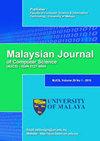二次分配问题的改进antlion优化算法
IF 1.2
4区 计算机科学
Q4 COMPUTER SCIENCE, ARTIFICIAL INTELLIGENCE
引用次数: 1
摘要
蚁群优化算法(ALO)是一种基于蚁群捕食蚂蚁的元启发式优化算法。该算法的根本不足在于蚂蚁的运动采用随机游走模型,运行时间过长。我们改进了ALO算法中的一些机制,如蚂蚁的随机行走、繁殖、蚂蚁向蚁群滑动、精英主义和选择程序。该算法被称为改进蚁群优化(IALO)算法。为了展示所提出的IALO算法的性能,我们使用了不同的度量指标,如平均最佳、标准偏差、最优性、准确性、CPU时间和函数评估次数(NFE)。采用不同的基准测试函数对本文提出的IALO算法进行了测试。文献中没有发现关于ALO算法时间分析的研究。本研究首先旨在证明所提出的IALO算法在运行时分析方面的成功。其次,将IALO算法应用于复杂的组合优化问题二次分配问题(QAP)。在QAP测试中,将IALO算法的性能与经典ALO算法和14种知名和最新的元启发式算法的性能进行了比较。基准测试函数的结果表明,IALO算法能够在平均最佳/标准偏差、最优性、准确性、CPU时间和NFE指标方面提供非常有竞争力的结果。CPU时间测试结果表明,IALO算法比经典的ALO算法更快。QAP测试结果表明,从平均代价、最差代价和标准差来看,本文提出的IALO算法具有最佳性能。提出的IALO算法的QAP的源代码可在https://github.com/uguryuzgec/QAP-with-IALO上公开获得。本文章由计算机程序翻译,如有差异,请以英文原文为准。
IMPROVED ANTLION OPTIMIZATION ALGORITHM FOR QUADRATIC ASSIGNMENT PROBLEM
The Antlion Optimization (ALO) algorithm is a meta-heuristic optimization algorithm based on the hunting of ants by antlions. The basic inadequacy of this algorithm is that it has long run time because of the random walk model used for the ant's movement. We improved some mechanisms in ALO algorithm, such as ants' random walking, reproduction, sliding ants towards antlion, elitism, and selection procedure. This proposed algorithm is called Improved Antlion Optimization (IALO) algorithm. To show the performance of the proposed IALO algorithm, we used different measurement metrics, such as mean best, standard deviation, optimality, accuracy, CPU time, and number of function evaluations (NFE). The proposed IALO algorithm was tested for different benchmark test functions taken from the literature. There are no studies regarding time analysis of ALO algorithm found in the literature. This study firstly aims to demonstrate the success of the proposed IALO algorithm especially in runtime analysis. Secondly, the IALO algorithm was also applied to the Quadratic Assignment Problem (QAP) known as a difficult combinatorial optimization problem. In QAP tests, the performance of the IALO algorithm was compared with the performances of the classic ALO algorithm and 14 well-known and recent meta-heuristic algorithms. The results of the benchmark test functions show that IALO algorithm is able to provide very competitive results in terms of mean best/standard deviation, optimality, accuracy, CPU time and NFE metrics. The CPU time results prove that IALO algorithm is faster than the classic ALO algorithm. As a result of the QAP tests, the proposed IALO algorithm has the best performance according to the mean cost, worst cost and standard deviation. The source codes of QAP with the proposed IALO algorithm are publicly available at https://github.com/uguryuzgec/QAP-with-IALO.
求助全文
通过发布文献求助,成功后即可免费获取论文全文。
去求助
来源期刊

Malaysian Journal of Computer Science
COMPUTER SCIENCE, ARTIFICIAL INTELLIGENCE-COMPUTER SCIENCE, THEORY & METHODS
CiteScore
2.20
自引率
33.30%
发文量
35
审稿时长
7.5 months
期刊介绍:
The Malaysian Journal of Computer Science (ISSN 0127-9084) is published four times a year in January, April, July and October by the Faculty of Computer Science and Information Technology, University of Malaya, since 1985. Over the years, the journal has gained popularity and the number of paper submissions has increased steadily. The rigorous reviews from the referees have helped in ensuring that the high standard of the journal is maintained. The objectives are to promote exchange of information and knowledge in research work, new inventions/developments of Computer Science and on the use of Information Technology towards the structuring of an information-rich society and to assist the academic staff from local and foreign universities, business and industrial sectors, government departments and academic institutions on publishing research results and studies in Computer Science and Information Technology through a scholarly publication. The journal is being indexed and abstracted by Clarivate Analytics'' Web of Science and Elsevier''s Scopus
 求助内容:
求助内容: 应助结果提醒方式:
应助结果提醒方式:


